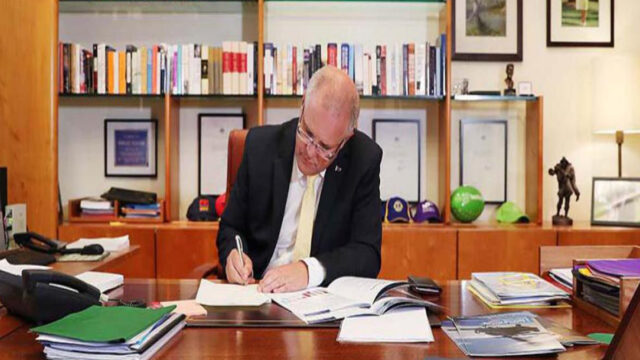Australian President Scott Morrison announced his plans to shut the embassy in Kabul, Afghanistan on 28th May 2021. This has given the world a reality check of the dire consequences of the withdrawal of the American troops from the country. There have been many concerns about the situation in the region post the United States makes the final move. Australia declared its commitment to the bilateral relationship and its support to the stability and development of the country. The President also said that the decision was temporary and will translate into something permanent once the conditions in Afghanistan improved. He believed that that were scope for much more in the country but was unsure of the security environment. He spoke of a USD 200 million assistance to Afghanistan for the period 2021-2024.
The United States plans to pull out all its troops by 11 September 2021. In April, President Joe Biden declared the end of “America’s longest war”. Since the process began, there have been reports of violence and human rights violations in the country. That has resulted in concerns all over the world about the condition under the future leadership in Afghanistan. The Taliban insurgents have started taking over the country and have been forcing the government officials to escape. There was a ceasefire declaration however the attacks by Taliban in eastern Afghanistan ended the one month peace.
Distressed Neighbours
There have been consistent efforts by countries around the world to convince Taliban for a peaceful transition. The Taliban attacks on government forces and installations in provinces have led to many deaths and fear of what lies ahead. An unstable Afghanistan will pose a threat to international security in several ways. Being a neighbour, it will be a big challenge for Pakistan. Islamabad offered support to Ashraf Ghani to pursue the peace process by taking all the stakeholders into the loop. Taliban is the source for illegal terrorist activities and its rise again will lead to problems in South Asia as well as the world. Afghanistan holds a strategic importance for the economic corridor that was to materialise between China and Pakistan. China fears that tussles in the country could risk the project. China approached the Central Asia countries for cooperation to contain terrorist activities and transnational crime. Russia has also strengthened its military along Central Asia before the final day. The United States is concerned about the situation and has talked of keeping a track on the country but the eruption of violence has lead to uneasiness. There have been discussions in the US about the possibility and means of evacuation of people who worked for America in Afghanistan. Their lives will be under threat with the new regime in power. Another aspect is the quick evacuation to avoid confrontation with Taliban seeing their speed of expansion.
Way Ahead
The Guardian reported that Taliban regards all Afghan nationals who worked with foreign governments in the past as traitors. The attacks, kidnappings and assassination were mainly targeted towards such individuals. The decision taken by the foreign governments to pull out of Afghanistan is problematic on several levels. From humanitarian risks to possible global threat capacity, Afghanistan is the site for all. Taliban has threatened the neighbouring countries to refrain from developing bases to host American military presence. Emergency passports and visa processes are being considered but the numbers are really big. American government’s spokesperson John Kirby stated that the Defense Secretary was worried about the Afghans who had helped the Americans for the last 20 years. Biden Administration is under pressure to carry out a safe withdrawal and even leave a secure life behind. But it seems extremely difficult.
The future of Afghanistan is uneasy and President Ashraf Ghani’s promises to ensure smooth transition seem out of the picture completely. Australia has set a precedent which might be followed by several countries. Afghanistan’s President Ghani had proposed fresh elections to ensure that the peace process in the country did not face hurdles. Taliban too had agreed to sever ties with terrorist organisations in a pact with the United States. Yet, the commitments promised are not being adhered to. If countries give up on Kabul, the prospects do not look hopeful.
It is imperative that the violence in Afghanistan is curtailed to ensure tranquility in the region. It is important to realise that no country can live or struggle in isolation. The ripples will be felt all over.









